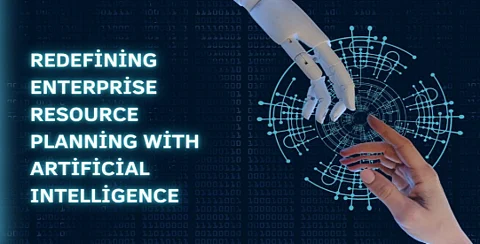

In the modern era, Poornachandar Pokala, an expert in enterprise technology solutions, delves into the groundbreaking advancements of artificial intelligence (AI) in Enterprise Resource Planning (ERP) systems. This article explores how AI is transforming ERP functionalities, driving efficiency, solving scalability challenges, and redefining decision-making to meet the demands of modern enterprises in an increasingly competitive landscape.
ERP systems evolved through time from basic data management to becoming inescapable tools for enterprise operations and strategy. However, the systems failed to scale well, lacked real-time processing, and could not even handle unstructured data; hence, they were not adaptive to abrupt changes in business requirements. AI-based systems emerged as a game-changer, with capabilities in the form of machine learning, NLP, and RPA. These innovations have propelled ERP from static data repositories to dynamic, intelligent platforms that offer proactive business insights, predictive analytics, and enhanced decision-making power.
AI-powered ERP system is leveraging smart analytics to extract actionable insights from business functions using data. Advanced prediction models increase predictive accuracy for many domains, like inventory management or customer behavior. Real-time anomalies and self-service analytics allow the organisations to detect trending performance so as to equip leaders with better solutions to optimize their strategy and become even more agile. With AI integration, decision support systems are developing into indispensable assets, saving costs, improving workflows, and delivering value at every level of enterprise operations.
AI technologies have revolutionized process automation. They help in smarter workflows, faster resource allocation, and optimized operational efficiency. RPA, with the enhancement from machine learning, is capable of making the mundane tasks automated while simultaneously recognizing changing operational needs and business environments. AI-driven workflow optimization identifies possible bottlenecks, adjusts dynamics, and maintains sustainable productivity across departments. Integration with legacy systems has become easy as well, which ensures that transitions are smooth, operational coherence is sustained, and costs are saved. Altogether, these help improve productivity while reducing manual error and enable businesses to scale up their processes more agilely with confidence.
AI innovations in ERP systems are creating better user experiences through adaptive, intuitive, and highly personalized interfaces. Natural language processing supports multi-language interactions, thereby making the system more accessible and user-friendly to diverse teams. Conversational AI, which incorporates chatbots and voice assistants, quickly resolves complex queries, thereby boosting the adoption rates of users and overall satisfaction levels by a great deal. This can also adapt to personalise the workflows according to behavior patterns for increased productivity and user engagement as well as lessened learning curve for new users and processes. This way, the ERP system will not only be powerful but also convenient and enjoyable to use.
ERP is redefining the core business domains by promoting industry-specific innovation and optimization due to AI integration. In the management of finances, AI-based applications provide better fraud detection, compliance monitoring automation, optimized cash flow, and increased accuracy in financial planning. The management of the supply chain improves demand forecasting using AI, optimization of inventory, real-time route planning, and mitigation of risks with resultant cost reductions and improved service levels. Leveraging AI in human resource management leads to acquiring potential talent, employee engagement analytics, and customized training programs to enhance employee satisfaction, productivity, and overall workforce efficiency in competitive environments.
While the benefits of AI in ERP systems are well-defined, there are still some challenges in terms of scalability, security, and seamless integration. Increasing data volumes demand robust infrastructures that can process, store, and analyze information quickly without delays. AI-enhanced cybersecurity frameworks address these concerns with real-time threat detection, automated incident response, and continuous system monitoring. These help enhance security metrics, ensure data integrity, and provide means of keeping organizations compliant with the regulatory standards across geographies. Overcoming such challenges is vital to the sustainable success of AI-driven ERP solutions.
The future of AI-driven ERP systems lies in integrating emerging technologies, such as advancements in edge computing, blockchain, and quantum computing. Edge computing reduces latency, enhances real-time processing, and enables faster decisions at the data source. Blockchain ensures secure and transparent transactions that make it easier to have better data integrity, process accountability, and system efficiency. Quantum computing promises breakthroughs in optimization and complex modeling and thus offers unprecedented potential for ERP applications and adaptive systems. As these technologies mature, they are going to redefine ERP capabilities as sophisticated, adaptive, and intelligent solutions to emerging enterprise challenges.
In conclusion, Poornachandar Pokala highlights how AI can drive ERP systems as the transformative catalyst to efficiency enhancement, better decision-making, and optimized business process reengineering. While embracing the solution of an AI-driven nature, enterprises should also face other challenges such as scalability, quality of data, and smooth integration towards reaping the proper benefits and potential of the solution. With the AI merge with all other emerging technologies, ERP undergoes a new era of developments promising unprecedented operation excellence, strategic agility, and enterprise innovation.
